Archive for January, 2013

Cops seize ganja and plants in George Town
 CNS): Police have arrested three people following a drugs operation in George Town on Thursday morning. The Serious Task Force raided a residence on Smith Road in the capital several pounds of ganja, some fully grown ganja plants, and a quantity of drugs paraphernalia were seized, the RCIPS said. The police also recovered two boat engines, which they believe were stolen. The three men, who were 28, 29 and 61 years old, were all arrested on suspicion of possession with intent to supply and consumption of ganja and are currently in police custody while enquiries continue.
CNS): Police have arrested three people following a drugs operation in George Town on Thursday morning. The Serious Task Force raided a residence on Smith Road in the capital several pounds of ganja, some fully grown ganja plants, and a quantity of drugs paraphernalia were seized, the RCIPS said. The police also recovered two boat engines, which they believe were stolen. The three men, who were 28, 29 and 61 years old, were all arrested on suspicion of possession with intent to supply and consumption of ganja and are currently in police custody while enquiries continue.
Vote in the CNS poll: Should ganja be legalized?

Mac warns of harder life
(CNS): The former premier has warned the country’s young people that they must be prepared for a harder way of life. In a message delivered to the media ahead of National Heroes Day, which this year celebrates Cayman’s young people, McKeeva Bush emphasised the need for economic development in Cayman in order to create jobs for the next generation. Bush, who will not be handing out the awards this year as a results of his own battles with the authorities and his former political colleagues following his arrest in December, also talked about the need for strong resolve, even in the face of “nay-sayers and doubters”, claiminging that what he did as a leader was for that the good of all but just to do good was “a real struggle”.
“As we seek to educate our children, our youth, we must also ensure that jobs are available for them to aspire to, and that means a strong economy, which means viable projects in our Islands and the support for investors, foreign and local businesses,” he stated in the message released Friday afternoon, adding that doubt and uncertainty, purposelessness and confusion was unnerving and undermining.
“Peace of mind comes to us only when having faced all issues clearly and without flinching, we have made our decisions and are resolved,” he said.
“Understand that there are those who are always nay-sayers and doubters — and in this life will always find some way to accuse, point fingers and raise doubt; and know in building a nation, it is most probable that no plan we propose will be supported by all — and so for me as a leader, to offer any young person what I myself cannot support — or that I disapprove of — how could I afterwards defend it? No! I must believe that what I do as an adult leader is for the good of all — recognising that just to do good is a real struggle. And so perhaps we have all lived the easy way and now must prepare you for the battle of a harder way.”
Speaking about building a future, whether it was a better financial industry, diversification of medical tourism, major and minor industries, the Economic City, or some new business development, he said the country must build and create jobs for this and the next generation.
See full statement below.
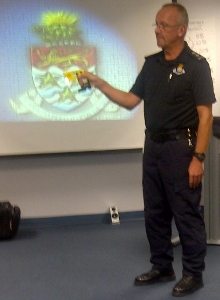
Cops armed with tasers
 (CNS): Police officers from the Uniform Support and Operational Support units of the RCIPS, along with officers based on Cayman Brac, will begin using tasers from 7am on the morning on Monday, 28 January. The police revealed details of the use of the less-lethal weapon by specially trained officers on Friday, when an RCIPS officer was used as a guinea pig for a media demonstration (see photo below). The weapon, which has been in used in UK police forces for several years and more recently rolled out in Bermuda, delivers a 50,000 volt shock to those on the receiving end of two spiked probes fired from the weapon. Police said that, with human rights and public safety issues in mind, the stun-guns will be used in potentially violent or dangerous situations as an alternative to pepper spray or firearms.
(CNS): Police officers from the Uniform Support and Operational Support units of the RCIPS, along with officers based on Cayman Brac, will begin using tasers from 7am on the morning on Monday, 28 January. The police revealed details of the use of the less-lethal weapon by specially trained officers on Friday, when an RCIPS officer was used as a guinea pig for a media demonstration (see photo below). The weapon, which has been in used in UK police forces for several years and more recently rolled out in Bermuda, delivers a 50,000 volt shock to those on the receiving end of two spiked probes fired from the weapon. Police said that, with human rights and public safety issues in mind, the stun-guns will be used in potentially violent or dangerous situations as an alternative to pepper spray or firearms.
Police say that lengthy research and consultation was undertaken into the effectiveness of these weapons before a decision to arm some officers with them. The weapon will supplement the RCIPS’ existing arsenal of equipment, such as batons, handcuffs, pepper spray and the firearms already carried by trained officers.
David Baines, the RCIPS commissioner, said that there were no immediate plans, or funding, to arm all officers with the weapon, which employs sophisticated technology to instantly restrain a violent suspect.
“The introduction of Taser provides more options for officers and ensures that they can evaluate the required response based on the circumstances they and members of the public are presented with, at each incident they attend,” Baines said. “The key phrases for us are ‘public safety’ and ‘proportionate deployment’. I’m confident that the training provided will ensure that proper appraisal takes place and the correct level of response is used. It provides an excellent alternative to batons, incapacitant sprays and guns, particularly in confined areas where there may be a risk of injuring innocent bystanders.”
While a taser instantly renders a person immobile and delivers an extremely painful instant shock, the painis said to be gone in a matter of seconds. However, this gives a short period of incapacity, which provides the police an opportunity to defuse a dangerous situation without resorting to the dangerous use of pepper spray or, worse, a gun.
The weapon temporarily incapacitates offenders and protects officers from directly engaging with dangerous suspects at close range, reducing the opportunities for injury to members of the public or the officers. It is described as a less-lethal device that bridges the gap between the baton and a firearm.
The police have bought 36 tasers, spending some $71,000 from the $5 milllion supplementary budget allocation voted for the RCIPS by officers in 2011. These will be used by trained officers purely from the USG, which is already an armed unit, and the Operational Unit, which supports those officers, and the Serious Crimes Task Force.
Five officers have now been trained by Taser International to act as instructors for the roll out of the device. Fifty-nine police officers in the USG, OSU and the Sister Islands have been trained to use the weapon and deal with the post deployment removal of the probes where possible.
The three day training teaches officers not only how but when to resort to the new weapon, using a combination of classroom-based learning and a series of role play scenarios. Inspector Ian Brellisford, who is the RCIPS firearms expert and training officer, has led the introduction of Taser into the service and believes it will make a real difference to both the public and the police in Cayman.
“This device will provide officers with a viable proportionate response option when dealing with violent offenders. When deployed, it temporarily incapacitates the muscles of the offender, enabling officers to quickly and effectively restrain him or her before the situation escalates or the suspect injures themselves, members of the public or the officers on scene.”
In addition, the new weapon has its own in-house camera, which films the taser incident when the weapon is fired. This Taser Cam automatically starts recording video and sound every time the Taser is drawn from its holster and aimed at an offender.
“Everything the officers say and does, as well as everything the offender says and does is available for use by the investigation teams, the Legal Department and to be viewed in the courts,” Baines explained. “It is yet another step towards modernising the RCIPS and ensuring that we not only maintain a professional approach, but also present the best transparent evidence available to take violent offenders off our streets, secure convictions and maintain the safety and security of the Cayman Islands.”
Inspector Brellisford said that because of the wide public interest in the weapon the RCIPS would be transparent about its use and where possible footage from the webcam would be released to the press. He said he was confident that, should there be any complaints against officers using the weapon, the Taser Cam would be able to justify that use.
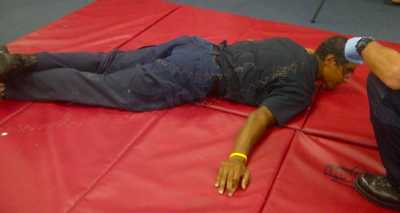 USG Officer PC Gabe Rabess, who volunteered to actually be tasered, said that the experience was extremely painful for a very, very short time. He was shot in the back in the demonstration but shortly afterwards said the pain had gone and the press saw that the officer was left with two small puncture wounds. Inspector Brellisford removed the probes and applied a couple of bandaids.
USG Officer PC Gabe Rabess, who volunteered to actually be tasered, said that the experience was extremely painful for a very, very short time. He was shot in the back in the demonstration but shortly afterwards said the pain had gone and the press saw that the officer was left with two small puncture wounds. Inspector Brellisford removed the probes and applied a couple of bandaids.
Nevertheless, there are dangers in its use and should a suspect be hit in the head, neck, face or genitalia, the suspect will be taken to hospital where medics will remove the probes.
As it is more than four years since any officer in the RCIPS was forced to fire a gun at a suspect, the police hope the use of the Taser will be equally rare but the additional technology offers officers a safe way to prevent violent suspects from hurting themselves, other people or the police without having to resort to the use of lethal firearms.
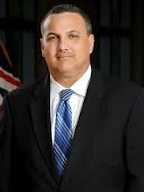
Government saves $16 million through job cuts
 (CNS): The next phase in government’s bid to reduce costs will take a harder approach than before, with government placing greater emphasis on reducing the number of civil servants, Deputy Governor Franz Manderson has said. Speaking at a business conference Thursday, he said government would be providing enhanced separation packages where it made good business sense for civil servants who request leave of their jobs. In total, government has managed to realise $16.2 million in savings for the budget in this current financial year by cutting jobs and other areas. He added that the goal was to reduce the headcount by 350 positions over a five-year period.
(CNS): The next phase in government’s bid to reduce costs will take a harder approach than before, with government placing greater emphasis on reducing the number of civil servants, Deputy Governor Franz Manderson has said. Speaking at a business conference Thursday, he said government would be providing enhanced separation packages where it made good business sense for civil servants who request leave of their jobs. In total, government has managed to realise $16.2 million in savings for the budget in this current financial year by cutting jobs and other areas. He added that the goal was to reduce the headcount by 350 positions over a five-year period.
In his address at the opening of the Cayman Business Outlook, Manderson, who is in charge of the Cayman government’s civil service, outlined recent cost reductions that had taken place within the civil service, netting government millions of dollars of savings during the current 2012/2013 financial year. During the 2012/13 pre-budget review 140 new posts had been eliminated, resulting in an estimated $6.4 million reduction to the draft budget.
Manderson said that the 3.2% cost of living allowance (COLA) had been rolled back, providing a further $4.2 million in savings for this financial year. Business cases must now be provided to his office prior to any employment decisions being taken and this, he stated, had allowed government to save an estimated $5.6 million for the first six months of this financial year. In total, these initiatives had realised the $16.2 million.
“While this first phase of initiatives focuses largely on mainly eliminating vacant posts and implementing short-to-medium cost reductions, the next phase takes a slightly harder approach towards actual head count reduction,” Manderson told the CBO audience at the Ritz Carlton.
“Under the voluntary separation policy no one will be pushed out of the service as the policy can only be triggered by a staff member making an application. However, enhanced separation packages will be offered where an accepted application makes good business sense for government.”
Running alongside this voluntary separation policy, Manderson said they were also conducting phase four of a review of public service to rationalise functions and services.
“This review will make recommendations about merging, consolidating or altering the services of agencies in order to better align their work with their mandates,” he confirmed. “In some cases it may mean eliminating the service altogether and, in others, contracting out to the private sector.”
Among other benefits that would come as a result of this review, Manderson said the civil service would become streamlined and a reduction of duplication would take place, resulting in an improved service for their customers.
“We must reduce the administrative cost of doing business in the Cayman Islands,” he said. “Government work in the areas of procurement and reduction of civil service costs is revolutionary.”
The outline initiatives showed that government was engaged in the battle to reduce costs and improve services and that it was working alongside the private sector to reduce the cost of doing business, he confirmed.
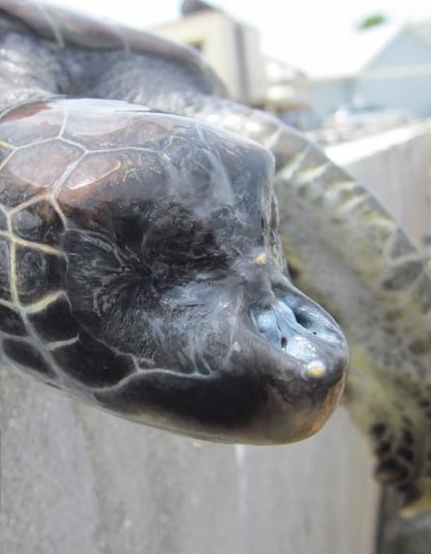
Report confirms CTF woes
 (CNS): The Cayman Turtle Farm was the subject of questions for both Premier Juliana O’Connor-Connolly on her trip to London and Tourism Minister Cline Glidden on his trip to Florida this week, in the wake of an the independent report that confirmed some of the findings of research conducted by the World Society for the Protection of Animals (WSPA). Glidden has said that the farm has begun to address some of the problems found in the report, including skin diseases and emaciation. However, according to the premier, the Foreign and Commonwealth Office (FCO) is taking a neutral position on the farm, maintaining that it is a “domestic issue” for CIG to deal with.
(CNS): The Cayman Turtle Farm was the subject of questions for both Premier Juliana O’Connor-Connolly on her trip to London and Tourism Minister Cline Glidden on his trip to Florida this week, in the wake of an the independent report that confirmed some of the findings of research conducted by the World Society for the Protection of Animals (WSPA). Glidden has said that the farm has begun to address some of the problems found in the report, including skin diseases and emaciation. However, according to the premier, the Foreign and Commonwealth Office (FCO) is taking a neutral position on the farm, maintaining that it is a “domestic issue” for CIG to deal with.
In the independent report released Friday morning, the panel concluded that there were “no significant issues of concern regarding the public facing aspect of the operation” but on the production side there was room for improvement in standards of care that required immediate changes in the infrastructure, processes, staffing and resources.
Skin lesions and mortality levels in younger age classes were highlighted by the report and the panel said that the farm should immediately implement additional intensive treatment and management of all animals with lesions based on best available information, euthanasia of animals with poor prognosis, and undertake veterinary pathological investigations of dead animals. The panel of researchers raised concerns that similar recommendations had been made in the past but have not been acted upon.
The researchers stated that there was strong evidence for the positive conservation impact ofCTF as it provides meat for Cayman’s national dish while alleviating pressure on the wild population, augmenting the local nesting population with releases and facilitating research and awareness of marine turtle conservation.
The panel recommended that CTF develop a set of short and long-term goals to rectify existing issues and that an independent advisory board be assembled to help support those goals. Given sufficient desire and motivation on behalf of managers and decision makers, the panel said its recommendations were achievable.
Glidden said that the independent report conducted in December had found no significant problems that should concern the cruise lines and he had addressed the issues raised by the Florida-Caribbean Cruise Association about passenger interaction with the turtles when he met with them last week.
While the turtle farm continues sucking money from the public purse on an annual basis to the tune of almost $10 million, the minister said that carrying out the changes at the farm as recommended by the report would not require additional subsidies from the public purse.
Responding to the report, the CTF said that it was taking the findings seriously but did not indicate why it had not responded in the past, having faced the recommendations before. Managing Director Tim Adam said the board the farm’s management team were committed to taking all possible steps to address the concerns.
“The resulting inspection report notes that the Cayman Turtle Farm makes several important positive contributions to the conservation of and research on green sea turtles, while also stating areas of concern requiring improvement,” he said.
Adam claimed that the report validated the CTF’s provision of a legal source of turtle meat as a way to assist in the prevention of illegal poaching and had found no evidence of congenital deformities among the population.
The CTF has now recruited of a full-time veterinarian, which Adam said would help fulfill several of the recommendations, such as intensifying the lesion treatment procedures. He added that recent experimental pre-clinical trials conducted by Dr Carlos E. Crocker from St. Matthew’s University School of Veterinary Medicine and Dr Walter Mustin of CTF had led to the development of medication protocols for the treatment of skin lesions
Adam said the Cayman Turtle Farm would do everything in its capabilities to improve the facility, the welfare of the turtles and safety for visitors.
“The Cayman Turtle Farm initiated this inspection and we are pleased that the inspection team noted our courteous, collaborative approach to their requests and questions. We believe that the recommendations of the report will serve to enhance the quality of Cayman Turtle Farm and what we offer,” Adam said.
See report below.
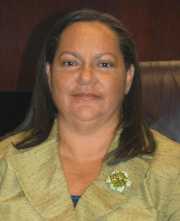
Premier gets overdraft buffer
 (CNS): Although the premier has said that government revenue collection is on target to exceed the 2012/13 budget, she has nevertheless requested a month’s extension on the government’s overdraft and has had a verbal permission from the UK for this. Juliana O’Connor-Connolly said this was merely a precautionary measure until all of the new legislation increasing fees in the offshore sector was implemented and to see government through this quarter of the year, in which it generally collects most of its revenue. The overdraft facility, which was more than $60 million, will, however, be cut to $30 million during February.
(CNS): Although the premier has said that government revenue collection is on target to exceed the 2012/13 budget, she has nevertheless requested a month’s extension on the government’s overdraft and has had a verbal permission from the UK for this. Juliana O’Connor-Connolly said this was merely a precautionary measure until all of the new legislation increasing fees in the offshore sector was implemented and to see government through this quarter of the year, in which it generally collects most of its revenue. The overdraft facility, which was more than $60 million, will, however, be cut to $30 million during February.
Speaking at a press briefing on Thursday morning, the premier said that Mark Simmonds, the overseas minister, had seen the sense in the analytical argument presented to him about the need for the financial buffer as a cautionary measure and she was confident that the CIG would receive written confirmation from him shortly.
She described the short trip to London this week as productive as she was able to mend some fences and address some of the issues relating to the negative perceptions regarding Cayman’s financial services that are persisting in London. O’Connor-Connolly said that she embarked on “some quiet diplomacy” and she assured the overseas territories minister that the new Cayman government was committed to the fiscal framework and that government was working hard in the short time it would hold office until the election and would “not become lackadaisical”.
She promised that her Cabinet would not sit on its laurels and the team was 110%, even though this would prevent their ability to get out on to the streets and campaign as the election approached.
The premier said she and her deputy, Rolston Anglin, had “worked hand in glove” during the trip to the UK, which had proved so positive. While she said she did not expect that talks with the UK and the overseas minister would always go so smoothly, she spoke about the need to work through any disagreements. “It is our responsibility to seek a positive outcome,” she said. “We won’t always succeed but we can try.”
She said that efforts were made to press Simmonds to defend Cayman on the world stage as one of best regulated financial centres in the world and to refute its image as a tax haven. She pointed to the work that Anglin was now doing and said she was confident that, as the minister for financial services, government now had someone with the “intellectual capacity to wrap his mind around the issues”, though she made no comment about how that reflected on his predecessor, the former premier, McKeeva Bush.
O’Connor-Connolly also addressed questions in London regarding the sudden change of government. The premier said she was able to tell them that the transition had been smooth and legitimate, conducted via the legislative framework in line with the constitution, and the interim government would continue smoothly until the general election.
The sentiments about the success of the London trip were also echoed by the governor, who released a short statement from his office about the trip to the UK as he had been one of the eight delegates.
“This was a productive meeting, held in a positive and constructive atmosphere,” Duncan Taylor stated. “The discussion covered a number of areas of mutual interest where we would all like to see greater engagement between the Cayman islands and the UK, including access to higher education in the UK for Caymanians, access to healthcare, working together to design a competitive procurement process for the port project in line with international best practice and working together to improve the management of public finances. The minister told me he looks forward to working with the new premier,” Taylor added.

Judge dismisses jury after legal wrangling
(CNS): A young George Town man will remain in custody while he awaits a second trial due to the potential prejudice of the legal arguments presented by attorneys in the first trial. Justice Charles Quinn discharged the jurors Wednesday half way through the trial of 21-year-old Justin Ramoon and a new panel of jurors will be selected in February to decide his fate. The judge released the seven member jury, stating that his decision was made in the interest of justice and the defendant. Ramoon is charged with attempted murder and an alternative count of wounding with intent in connection to a stabbing that occurred in the parking lot of Archie’s Bar on Shedden Road in August of last year.
Ramoon upholds his innocence, despite being identified by the victim, Andrew Lopez, who is the crown’s primary witness. Lopez claims to have known the defendant for a number of years and has identified Ramoon as the person who had attacked and continuously stabbed him from behind as he stood by his car drinking outside the George Town bar.
During the attack Lopez sustained wounds in multiple areas, as well as a punctured lung, which was discovered upon his arrival to the Chrissie Tomlinson Memorial Hospital, where he was questioned by a number of police officers.
Following the dismissal of the jury, Ramoon was remanded in custody to HMP Northward until his return to court for a new trial date.
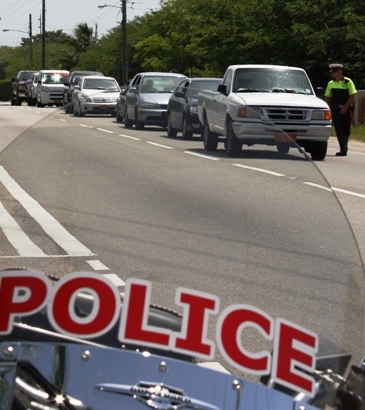
Cops arrest 100s over non-payment of traffic tickets
 (CNS): Well over 300 arrest warrants have been issued in the last four months for people who have failed to pay traffic tickets or turn up to court to contest the accusations of traffic violations. Police said Thursday that over 27% of all of the tickets issued since the new Traffic Law came into force last September have not been paid and as a result 313 arrest warrants have been issued for non-payment of traffic fines. The RCIPS said motorists had a responsibility to paying their fines on time and Chief Inspector Angelique Howell pointed out that the conditions of payment are prominently displayed on all traffic tickets issued by the officers.
(CNS): Well over 300 arrest warrants have been issued in the last four months for people who have failed to pay traffic tickets or turn up to court to contest the accusations of traffic violations. Police said Thursday that over 27% of all of the tickets issued since the new Traffic Law came into force last September have not been paid and as a result 313 arrest warrants have been issued for non-payment of traffic fines. The RCIPS said motorists had a responsibility to paying their fines on time and Chief Inspector Angelique Howell pointed out that the conditions of payment are prominently displayed on all traffic tickets issued by the officers.
Encouraging people who receive tickets to read them carefully to fully understand the implications of failing to comply with the conditions she said, “The ticket can be paid any time up to 10am on the date cited on the ticket. This date is three weeks from the date of issue.”
Howell has also issued an instruction to officers to further emphasise to offenders the need to comply with the payment terms and court date cited. “Anyone who fails to pay the ticket, or wishes to contest it, must appear in traffic court on the date cited,” she added. “Failure to pay or appear will result in the issue of an arrest warrant. The issue of such a warrant has serious implications for the offender as he or she will be arrested and immediately brought before the courts to be dealt with.”
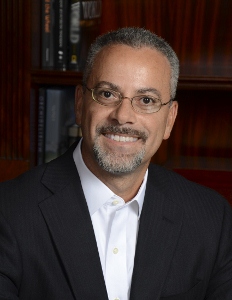
Scott admits political calling and declares for GT
 (CNS): One of the leaders of the Coalition for Cayman, Jude Scott, has finally declared his hand and his intention to fight for one of the six seats that will be up for grabs in the capital. Former partner of Ernst & Young and former global CEO of Maples & Calder, Scott has announced his intention to run for office in George Town as an independent candidate but it is clear he will have the support and backing of the coalition. The controversial group that is struggling to define itself on Cayman's political landscape has still not declared itself as a political party, despite now having two people who were involved in its formation running for office. Scott said that his decision to enter the political fray was not a job but a calling.
(CNS): One of the leaders of the Coalition for Cayman, Jude Scott, has finally declared his hand and his intention to fight for one of the six seats that will be up for grabs in the capital. Former partner of Ernst & Young and former global CEO of Maples & Calder, Scott has announced his intention to run for office in George Town as an independent candidate but it is clear he will have the support and backing of the coalition. The controversial group that is struggling to define itself on Cayman's political landscape has still not declared itself as a political party, despite now having two people who were involved in its formation running for office. Scott said that his decision to enter the political fray was not a job but a calling.
“We deserve an ethical and capable government that puts country first,” Scott said. “This is our home and we have a duty to protect it. Yes, there are many issues to face but together we can build a stronger, healthier Cayman. This is not a career for me, this is a calling. I came from humble beginnings and Cayman has been very good to me. I want future generations to experience the same opportunities that I had. We can fix our country, it just takes selflessness, setting aside differences and working for the greater good of these unique islands we call home.”
He added that the constituents of George Town can expect truthful, thoughtful, practical solutions to benefit the capital and the country. “My constituents can expect fearless but dignified representation of which they can be proud,” Scott said in a release announcinghis candidacy.
Promising to tackle government spending, the economy and immigration, the financial expert said he would also address the most basic needs of employment, safety, cost of living and a community voice in decisions that affect the country. “I have the courage, dedication and the ability to lead and I can achieve workable solutions for a better Cayman. United, we can be the change we want to see,” Scott said.
Advocating a collaborative approach to the best solution and the need to include ideas, knowledge and expertise from the community, he said a large part of his campaign would centre on community input with the goal of creating a joint vision for a healthy Cayman.
“The voices of my constituents will be heard,” promised Scott, although he hopes to represent the largest and most diverse group of voters in Cayman. “These are challenging times and every stakeholder must have their say.”
Scott has previously served as the chairman of the board of Cayman Airways and on the Ministerial Council for Tourism and Development. He retired from his career at Ernst & Young in 2008 after spending 23 years with the firm. Over the years, Scott has served on various boards and committees of the CaymanIslands Baptist Church, Cayman Islands Society of Professional Accountants, Cayman Islands Stock Exchange, Cayman National
Corporation, Constitutional Commission, Education Council, Financial Services Council, Hedge Funds Care and the National Recovery Fund.
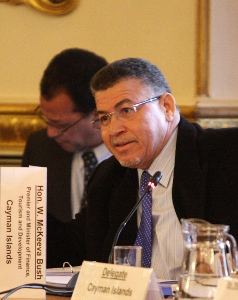
Mac pulls out of CBO debate
 (CNS): Delegates looking forward to seeing former premier McKeeva Bush Thursday afternoon at the CBO’s political debate were disappointed as he pulled out of what had promised to be an interesting debate with his former UDP colleague, Rolston Anglin, who is now deputy premier, and Leader of the Opposition Alden McLaughlin. Although it had been announced that he would be appearing at the CBO conference, the UDP leader sent word that, as it was the anniversary of his daughter's death, he had decided not to participate. He was replaced by backbench MLA Ellio Solomon, who joined political veterans Anglin and McLaughlin for the debate, moderated by Cayman 27’s Ben Meade.
(CNS): Delegates looking forward to seeing former premier McKeeva Bush Thursday afternoon at the CBO’s political debate were disappointed as he pulled out of what had promised to be an interesting debate with his former UDP colleague, Rolston Anglin, who is now deputy premier, and Leader of the Opposition Alden McLaughlin. Although it had been announced that he would be appearing at the CBO conference, the UDP leader sent word that, as it was the anniversary of his daughter's death, he had decided not to participate. He was replaced by backbench MLA Ellio Solomon, who joined political veterans Anglin and McLaughlin for the debate, moderated by Cayman 27’s Ben Meade.
Although Bush was listed in the programme and seen as a key figure to take part in the planned panel debate, the former premier has remained absent from the conference.
After three previous show stopping 'State of the Nation’ addresses at the CBO and his lively participation in a head-to-head with the then leader of government business KurtTibbetts in January 2009 ahead of the election that year, there were high expectations for a classic Bush performance during the debate, given his recent arrest and fall from office.
The State of the Nation address was delivered Thursday morning by the new premier, on her return from London. Juliana O’Connor-Connolly gave an account of where the country stands at the start of 2013 but with none of the surprise announcements that her predecessor was prone to deliver when he was on the same platform.
O’Connor-Connolly concentrated on the need for stability, especially in regard to the Cayman Islands’ relationship with the UK. She said that quiet diplomacy had achieved more than confrontation and said she had “rekindled the lost spirit of understanding”, also noting the need for a healthy partnership with the UK and mutual respect.
Although she said that Cayman was not out of the “dark woods” of economic recession yet and that many people were feeling the pinch, there was plenty of room for hope, she said, as she pointed to the positive recent developments for Cayman in terms of tourism and an improvement in the first six months of this financial year in government revenue.
She said that core government, excluding government companies and statutory authorities, had at the half way point of this fiscal year collected more revenue than anticipated and had spent less money. As a result, with spending down by $11 million and revenue up around $6 million, it was on target for a $17 million increase in the forecast surplus of some $82 million.
The premier also spoke about the same projects that the premier had depended on as Cayman’s economic saviours, such as the Shetty Hospital, Cayman Enterprise City and the ForCayman Investment Alliance, but the new premier also noted the importance of transparency when it came to the cruise berthing facilities. However, so far the interim government has shown less inclination towards transparency when it comes to the Dart deal and in particular the still undisclosed KPMG report.
Pointing to the increase in work permits as a positive indicator that the economy was on the turn as businesses looked to increase staff, the new premier urged the private sector to help government tackle unemployment in the local population and rise to the challenge of creating a sustainable economy in Cayman.